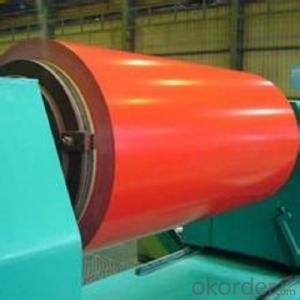Color Coated Aluminium Coil for Roofing and Cladding System
- Loading Port:
- Shanghai
- Payment Terms:
- TT OR LC
- Min Order Qty:
- 2.5
- Supply Capability:
- 5000 m.t./month
OKorder Service Pledge
OKorder Financial Service
You Might Also Like
Item specifice
1060/1050 Aluminium Coil for Transformer/ Electronic Components
l Product Description
Alloy: | A1100, A1050, A1060,A3003, A3004, A3005, A3105 , A5052, , A5754, A8011 etc. | |
2 | Temper: | H14, H16, H18, H24 etc. |
3 | Thickness: | 0.2mm - 2.0mm |
4 | Width: | 15mm - 1600mm |
5 | Color: | chromic,white,metallic and so on(Customized, choose from RAL color chart or refer to customers' counter sample.) |
6 | Coating: | Polyester(mainly),Fluorocarbon(mainly),polyurethane and epoxy coating ect. |
7 | Coating thickness: | PVDF≥25 micron; PE≥18 micron. |
8 | Surface Quality: | be free from Oil Stain, Dent, Inclusion, Scratches, Stain, Oxide Dicoloration, Breaks, Corrosion, Roll Marks, Dirt Streaks and other defect which will interfere with use. |
9 | Mechanical Property: | Chemical Composite and Mechanical Property are meted with GB/T, ASTM, ENAW Standard. |
10 | Interior diameter: | 105mm or 405mm or 505mm |
11 | Coating hardness: | (pencil hardness) more than 2H |
12 | Impact resistance: | no cracking and peeling(≥50kg/cm) |
13 | Flexibility(T-bend) : | ≤ 2T |
14 | MEK resistance: | more than 100 |
15 | Packaging Detail: | standard export packing in carton and wooden pallet |
16 | Payment Detail: | 30% deposit by T/T in advance,70% balance should be paid upon BL copy |
18 | Application: | roofs, facade cladding, ceilings, aluminum curtains, composite panels, pipe wrap, advertisement plates, instrument panels, and other uses. |
l Packaging & Delivery
Packaging detail: pallets, waterproof paper and plastic coverage or as customer's requirements
Delivery detail: within 30 days after we get your 30% deposit or L/C
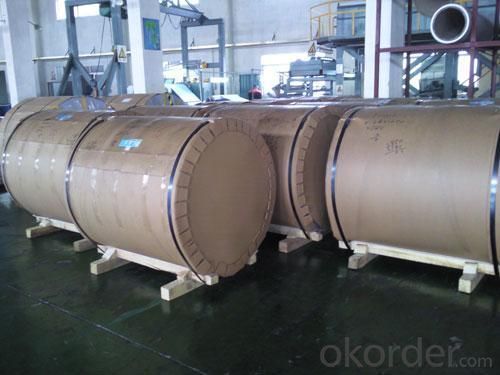
l Company Profile
CNBM International Corporation, China National Building Materials (Group) Corporation, is one of the largest companies in China building material & equipment industry, with 42,800 employees and sales in 2005 of US Dollar 4.395 billion. In 2006, China National Building Material Company Limited was listed on Hong Kong Stock Market with the stock code as 3323. |
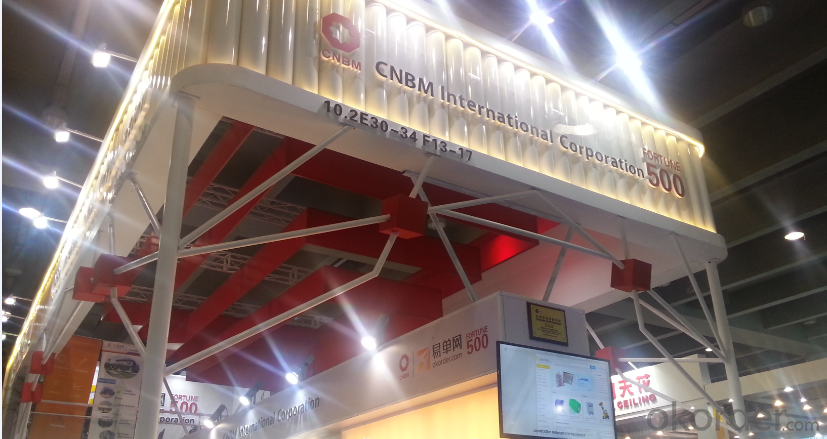
l Product Images
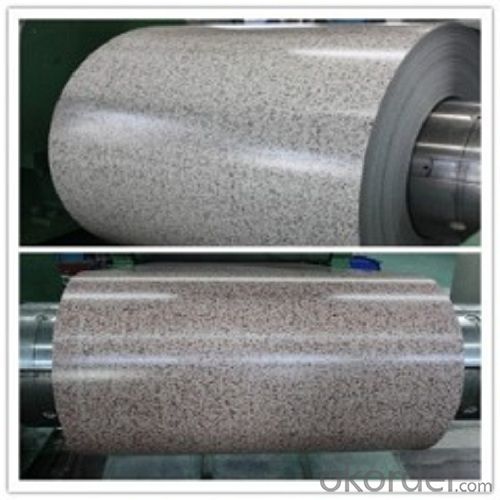
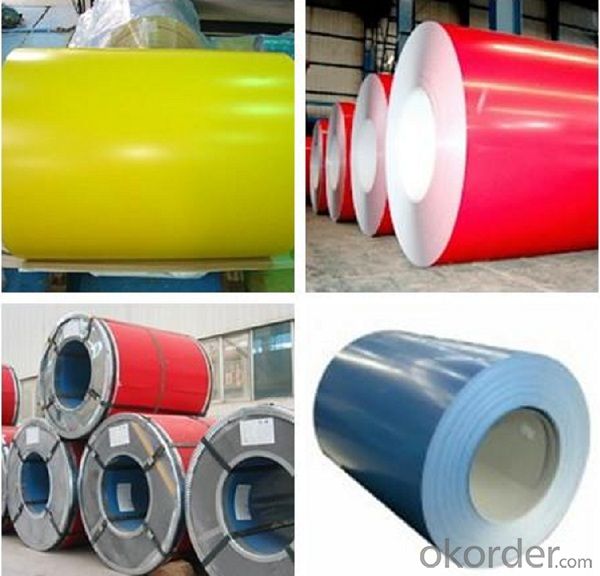
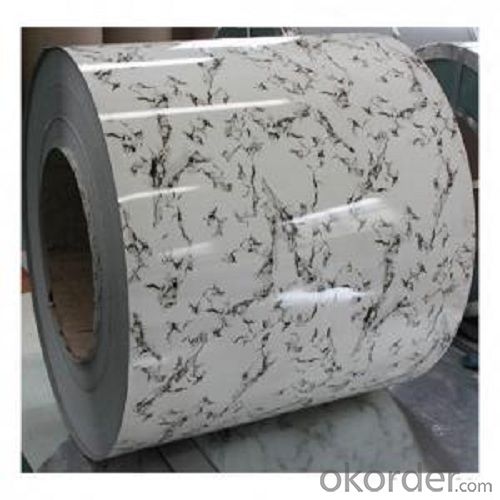
l Certificates
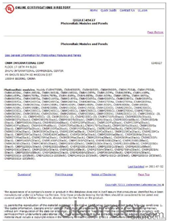
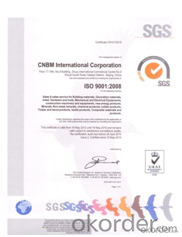
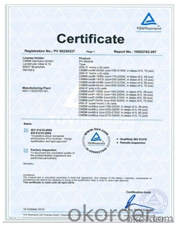
l FAQ
Q: Do you provide free samples?
A: Yes, free samples will be sent to you on freight at destination.
Q: Can I get your latest products catalogue?
A: Yes, it will be sent to you in no time.
Q: What is the MOQ?
A: 2.5 tons
Q: What are your payment terms?
A: We accept L/C, T/T
- Q:Can aluminum coils be used in electrical or electronic applications?
- Aluminum coils find utility in electrical and electronic applications. This material, known for its high conductivity, offers various advantages over alternatives like copper in coil applications. Their lightweight nature renders aluminum coils appropriate for weight-sensitive applications. Furthermore, they possess excellent thermal conductivity, ensuring efficient dissipation of heat. Moreover, aluminum coils exhibit resistance to corrosion, making them durable and suitable for outdoor or high-humidity settings. Nonetheless, it is crucial to acknowledge that aluminum's electrical conductivity is lower than that of copper. Hence, the coil's design and dimensions must be meticulously considered to ensure optimal performance.
- Q:Are there any restrictions on the coil thickness of aluminum coils?
- Aluminum coils usually have restrictions on their thickness. The specific restrictions vary depending on the intended use and industry standards. Generally, the thickness of aluminum coils is limited by the capabilities of the manufacturing equipment and the desired end product. Applications that require flexibility, such as foils or flexible packaging materials, often prefer thinner coils. Conversely, industries like construction or automotive, where strength and durability are crucial, commonly use thicker coils. Availability and cost of raw materials may also limit the thickness of aluminum coils. Manufacturers must adhere to these restrictions to guarantee the quality and performance of the final product.
- Q:Can aluminum coils be used in low-friction applications?
- Yes, aluminum coils can be used in low-friction applications. Aluminum is a lightweight and corrosion-resistant material that has excellent thermal conductivity. These properties make it suitable for various applications where low-friction is desired. In industries such as automotive, aerospace, and HVAC systems, aluminum coils are often used in heat exchangers, evaporators, condensers, and cooling coils. These coils are designed to efficiently transfer heat, while minimizing friction and energy loss. Additionally, aluminum coils can be used in electrical motors, generators, and transformers, where low friction is essential for smooth operation and reduced energy consumption. The lightweight nature of aluminum also helps to reduce the overall weight of the system, leading to improved efficiency. Furthermore, aluminum coils can be utilized in various types of machinery and equipment that require low friction, such as conveyor systems, sliding mechanisms, and bearings. Aluminum's low coefficient of friction allows for smooth and efficient movement, minimizing wear and tear on the components. Overall, aluminum coils are a versatile solution for low-friction applications due to their lightweight, corrosion-resistant, and thermally conductive properties. Their use can lead to improved energy efficiency, reduced maintenance costs, and enhanced performance in a wide range of industries.
- Q:Briefly describe the process of aluminum production from bauxite. Describe the electrolyte and write the anode and cathode half-reactions.
- Bauxite is purified by washing with sodium hydroxide and then seeding with dry ice. The purified aluminium oxide is then dissolved in molten cryolite at 900 degrees C (the electrolyte). It is electrolysed with grapite anodes and a graphite cathode that acts as the vessel for the reaction. Anode; 2 O2- - O2(g) + 4e Cathode: Al3+ + 3e - Al(l)
- Q:What is the tensile strength of aluminum coils?
- The tensile strength of aluminum coils can vary depending on the specific alloy and temper used. However, on average, aluminum coils have a tensile strength ranging from 150 to 300 megapascals (MPa). This means that aluminum coils can withstand a pulling force of 150 to 300 MPa before breaking or deforming. It is important to note that the tensile strength may be influenced by factors such as the thickness of the coil, the manufacturing process, and any additional treatments or coatings applied to the aluminum.
- Q:Classification of aluminium rolls for aluminium rolls
- The utility model has the advantages of good usability, good interface characteristics, easy coating and good processability. It can be used on low pressure weapons and aircraft joints.6061 general features: excellent interface features, easy coating, high strength, good usability, strong corrosion resistance.Typical use: 6061 aluminum aircraft parts, camera parts, couplers, ship accessories and hardware, electronic accessories and fittings, decoration or various hardware, hinge head, head, brake piston, hydraulic piston, valve and valve parts, electrical accessories.
- Q:i want to save some money on my electricity bill, and i heard that aluminum foil rejects the heat that goes through the windows, also does it work with the cold?
- If this is a house then it is your determination, if this is an condominium then you will greater advantageous verify with the administrative. maximum construction do no longer decide for aluminum foil on the residing house windows because it degrades the appearance of the residing house/condominium.
- Q:so i have a dirtbike and i wanted to polish the swing arm.i have 100 grit,400,800 and 1200.i use to 100 to take off the coating the swing arm has and once its off its like a natural aluminum left.well i polished it before and it came out real good to a mirror finish.well i did the other half of the swing arm exactly the same even with new sand paper and it just didnt shine like the other half!i wet sanded it and i used car wax as my buffing compound,yes i used a soft buffing wheel.the car wax works really good!thats how i got the first half to a mirror shine but the other half just wasnt working for me.any suggestions?oh and i sanded in all one direction.
- Use 1200 to 2000 grit. Your sandpaper is way too course! The paper probably got gummed up With aluminum particals. Use water or oil to wash away particals. In other words wet sand it. Then get this polish called Mothers Aluminum Polish. And two micro fiber cloths. Use the mothers and wipe off with first towel. Then use second towel. Trust me! I spend alot of time in my machine shop making custom aluminum parts. If you can trickle water over the surface of what your polishing it helps. The 1200 to 2000 grit can be purchased at Walmart in the auto section.
- Q:How are aluminum coils different from steel coils?
- Aluminum coils and steel coils differ in several aspects. Firstly, aluminum is a lighter metal than steel, which means that aluminum coils are significantly lighter than their steel counterparts. This makes aluminum coils easier to handle and transport, reducing the overall weight of the final product. Secondly, aluminum has a higher corrosion resistance compared to steel. Steel coils are prone to rust and corrosion over time, especially when exposed to moisture or harsh weather conditions. On the other hand, aluminum coils have a natural oxide layer that acts as a protective barrier against corrosion, making them more durable and long-lasting. Furthermore, aluminum has a higher thermal conductivity than steel. This means that aluminum coils can transfer heat more efficiently, making them ideal for applications that require excellent heat dissipation. Steel, being a poor conductor of heat, is less effective in dissipating heat and may retain heat for longer periods. Another significant difference is the aesthetic appeal. Aluminum coils have a natural silver-gray color, giving them a sleek and modern look. Steel coils, on the other hand, are typically coated or painted to enhance their appearance and protect them from corrosion. Lastly, the cost factor plays a role in distinguishing aluminum and steel coils. Aluminum is generally more expensive than steel, mainly due to the higher production costs associated with aluminum extraction and processing. However, the long-term benefits of using aluminum coils, such as lower maintenance and replacement costs due to its corrosion resistance, can offset the initial higher investment. In summary, aluminum coils differ from steel coils in terms of weight, corrosion resistance, thermal conductivity, aesthetics, and cost. These differences make aluminum coils a popular choice in various industries where lightness, durability, heat dissipation, and corrosion resistance are crucial factors.
- Q:What are the different types of end conditions for aluminum coils?
- Aluminum coils have several types of end conditions, which determine how the ends of the coil are prepared for different applications. Some common end conditions for aluminum coils are as follows: 1. Mill Finish: This is the most basic and widely used end condition for aluminum coils. In mill finish, the coil ends are left untouched after coming off the rolling mill, without any additional processing or finishing. This end condition is suitable for applications where the appearance of the ends is not crucial. 2. Trimmed or Sheared: In this end condition, the coil ends are trimmed or sheared to eliminate any uneven or rough edges. This results in clean and smooth ends, which are often necessary for applications that require precise fitting or appearance. 3. Slit: Slitting refers to cutting an aluminum coil into narrower strips or coils. Slitting is commonly done to customize the width of the coil according to specific requirements. The ends of slit coils can have either mill finish or trimmed ends, depending on the desired application. 4. Recoiled: Recoiling involves rewinding a coil into a smaller or larger coil diameter. This end condition is frequently employed when smaller coils are needed for storage, transportation, or further processing. Recoiling can be done with or without additional trimming or shearing of the ends. 5. Flattened: Flattening is the process of unrolling and flattening the coil to create a sheet or plate. This end condition is often used when the aluminum is intended for further fabrication, such as stamping, forming, or cutting into specific shapes or sizes. The ends of flattened coils are typically trimmed to ensure a clean edge. It is important to note that the specific end condition required for aluminum coils may vary depending on the intended application and customer specifications. Different industries and uses may have unique end condition requirements to ensure optimal performance and appearance of the aluminum coils.
1. Manufacturer Overview |
|
|---|---|
| Location | |
| Year Established | |
| Annual Output Value | |
| Main Markets | |
| Company Certifications | |
2. Manufacturer Certificates |
|
|---|---|
| a) Certification Name | |
| Range | |
| Reference | |
| Validity Period | |
3. Manufacturer Capability |
|
|---|---|
| a)Trade Capacity | |
| Nearest Port | |
| Export Percentage | |
| No.of Employees in Trade Department | |
| Language Spoken: | |
| b)Factory Information | |
| Factory Size: | |
| No. of Production Lines | |
| Contract Manufacturing | |
| Product Price Range | |
Send your message to us
Color Coated Aluminium Coil for Roofing and Cladding System
- Loading Port:
- Shanghai
- Payment Terms:
- TT OR LC
- Min Order Qty:
- 2.5
- Supply Capability:
- 5000 m.t./month
OKorder Service Pledge
OKorder Financial Service
Similar products
New products
Hot products
Related keywords
